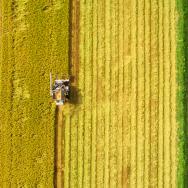The National Artificial Intelligence Research Institutes program has announced the formation of a new institute to accelerate artificial intelligence research and agricultural innovation. The institute aims to use AI to tackle important challenges in agriculture, including such projects as developing a prototype autonomous “farm of the future.”
Established with a $20 million, five-year grant, the new Artificial Intelligence for Future Agricultural Resilience, Management and Sustainability (AIFARMS) Institute includes the Pritzker School of Molecular Engineering at the University of Chicago and the University of Illinois at Urbana-Champaign.
Headquartered at UIUC’s Center for Digital Agriculture, AIFARMS is the result of a joint effort between the National Science Foundation and U.S. Department of Agriculture’s National Institute of Food and Agriculture. It is one of only two joint NSF-NIFA AI institutes in the country.
At AIFARMS, scientists, PhD students, postdoctoral researchers, extension specialists and diverse industry partners will come together to address major agricultural challenges such as labor constraints, animal health and welfare, environmental crop resilience and soil health.
Supratik Guha, professor at Pritzker Molecular Engineering and senior advisor at Argonne National Laboratory, leads the UChicago effort. His research focuses on soil- and water-monitoring sensor networks.
“Over the past five years we have been working on developing sensor networks at geographical scale that can collect soil and water data at high resolution in space and time,” Guha said. “Working with colleagues as part of the AIFARMS team, we will develop these cyberphysical systems in tandem with artificial intelligence approaches for building a better understanding of agricultural models.”
Guha will work alongside 40 researchers from UIUC, the Donald Danforth Plant Sciences Center, Michigan State University, Tuskegee University, the USDA Agricultural Research Service and Argonne to explore foundational AI goals and innovative uses of AI to tackle important challenges in agriculture.
For instance, AIFARMS will help develop a prototype autonomous “farm of the future,” anticipating a world in which low-cost AI-driven systems enable breeders and farmers to achieve large improvements in yields and profitability with minimal or even positive environmental impacts.
The institute combines deep research expertise with strong education and outreach programs in digital agriculture to grow a diverse workforce with AI skills, reach rural and other underserved populations, and create a global clearinghouse to foster community-wide collaboration in AI-driven agricultural research.
The AIFARMS Institute is led by Vikram Adve, principal investigator and Donald B. Gillies Professor of Computer Science at Illinois’ Grainger College of Engineering.
“I’m excited and humbled to be leading the AIFARMS Institute. Illinois and our partner institutions are world leaders in the areas of computer science, artificial intelligence, and agriculture research, and these strengths are reflected in the breadth and depth of the AIFARMS team,” said Adve. “By fostering close collaborations between these researchers, and by growing and diversifying a workforce skilled in digital agriculture, we have an exciting opportunity to help address some of the most daunting challenges faced by world agriculture today.”
The National Artificial Intelligence Research Institutes program was created in response to the White House’s 2019 update to the National Artificial Intelligence Research and Development Strategic Plan, which aims to provide support for AI research that focuses on impacting and improving society.
—A version of this release was first published by the Pritzker School of Molecular Engineering.

